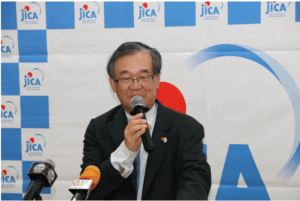Strengthening Academic Ties Between Ghana and Japan
Ghana and Japan have taken significant steps to enhance their academic cooperation through the 3rd JICA Chair programme. This initiative, jointly hosted by the University of Ghana (UG) and the Japan International Cooperation Agency (JICA), focuses on the role of artificial intelligence in Japanese media. The programme aims to foster deeper understanding and collaboration between the two nations, particularly in the field of education.
A Strong Foundation of Mutual Respect and Shared Goals
During the event, Japanese Ambassador to Ghana Hiroshi Yoshimoto emphasized the strong relationship between Japan and Ghana, which is built on mutual respect and shared aspirations. He highlighted that education has long been a key area of cooperation between the two countries. Over the years, Japanese institutions and the government have supported various capacity-building initiatives in Ghana, including scholarships and academic exchanges.
The ambassador also mentioned several programmes designed to support Ghanaian students and researchers, such as the MEXT scholarship, JDS for public officials, and the ABE Initiative. These programmes are structured to help shape the future of Ghana’s young generation by providing them with opportunities to study and research in Japan.
Encouraging Collaborative Efforts
Ambassador Yoshimoto pointed out the long-standing partnership between the University of Tokyo and UG, which allows students from both institutions to engage in discussions about the future of education. He encouraged more such collaborations, stating that they provide valuable opportunities for academic exchange, mutual learning, and strengthening ties between Japan and Ghana.
He also introduced the Japanese philosophy of Kaizen, which emphasizes continuous improvement. According to him, Japanese-style education incorporates this philosophy by fostering moral values such as teamwork and a sense of responsibility—principles that align closely with Kaizen. These values, he said, can offer meaningful insights to support and strengthen Ghana’s educational system.
The Future of Journalism in the AI Era
The lecture, titled “From Ink to Intelligence: The Future of Japanese Journalism in the AI Era,” explored the evolving landscape of journalism. Ambassador Yoshimoto observed that journalism, as one of the pillars of democracy, is at a critical crossroads. He noted that AI technologies are transforming the rules of news production, offering tools to enhance efficiency while raising ethical concerns.
He stressed the importance of keeping journalism focused on its core purpose of serving the public good amidst the ongoing development of AI. As AI reshapes various aspects of life, he emphasized the need for stronger collaboration among researchers and institutions in areas such as education, technology, agriculture, and journalism.
Expanding the JICA Chair Programme
Suzuki Momoko, Chief Representative of JICA Ghana, spoke about the special lecture as part of the ongoing JICA Chair programme in Ghana. She stated that the initiative aims to deepen mutual understanding of Japan’s development experience and culture. Through these exchanges, she added, the relationship between Japan and Ghana continues to grow stronger.
She also announced the upcoming 9th Tokyo International Conference on African Development (TICAD9), scheduled to take place from August 20–22 in Yokohama, Japan. Since its inception in 1993, TICAD has served as a major international conference led by the Japanese government in partnership with the United Nations, World Bank, and African Union. It focuses on Africa’s development and brings together leaders and experts from across the continent and beyond to discuss sustainable development and cooperation.
Insights into Japanese Journalism
The lecture delivered by Executive Vice President of the University of Tokyo, Prof. Hayashi Kaori, traced the evolution of Japanese journalism from its 19th-century origins in print culture to its current engagement with artificial intelligence. She highlighted that despite Japan’s strong legacy in newspaper journalism, the industry now faces pressure to innovate while maintaining editorial integrity.
Prof. Hayashi noted that media organizations are cautiously adopting AI for automation and content generation, but they remain concerned about ethics, accuracy, and regulation. She emphasized that Japan’s uniquely conservative and institution-driven media landscape shapes its response to technological change. By tracing this historical and cultural continuity, the lecture provided valuable insights into how Japanese journalism is navigating the tension between tradition and transformation in the AI era.

